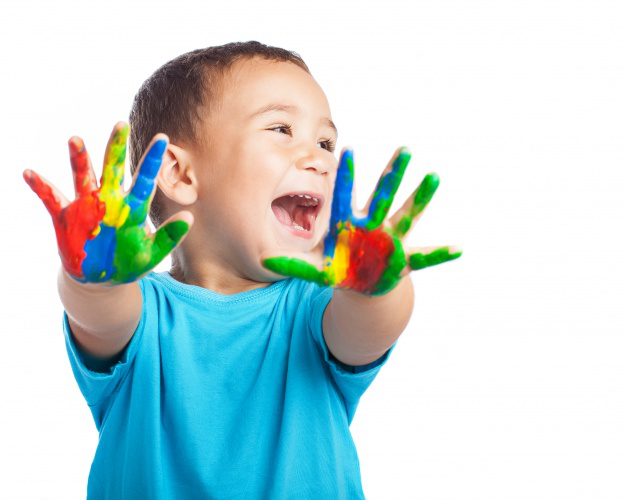Only A Few Spaces Left For Our Premier VPK Program! We Are Now Enrolling & Would Love to Meet You & Your Family!
Get More Information About Our VPK Program: Click Here
Children learn and develop skills through a number of heterogeneous activities. While math and science programs are vital for intellectual development, simple play-based activities and art projects can stimulate imagination, exploration and invention at an early age. Open-ended creative and art activities—in a variety of settings—lay the foundation for cognitive, emotional and motor development in the early years, leading to enriched learning during school and elementary years.
In America, over the years, academia for childhood education has seen a number of changes owing to the new research and studies—that support the undeniable role of music, arts and crafts in providing children unique opportunities. To understand why these experiences are important for children, let’s take a look at some developmental benefits they offer.
Art provides an outlet for children to explore and nourish their creative side. Research says that when children are able to make their own choices in terms of activities and creating things, their decision-making skills improve. As they try new ideas on their own, they’re better able to integrate them while playing, based on critical thinking.

A happy child will put more thought into their activity and shape it in a way that offers satisfaction. A child who is experiencing negative emotions will use art and craft to express their feelings either by drawing aggressively or changing the design of the whole project.
Art, music and even dance help children express themselves even when they’re unable to form sentences and relay their feelings in words.
Children playing with colors for the first time or using dough and clay to build new things tend to learn new words. A child who doesn’t understand what green color is will be finally able to understand the concept of both the word ‘color’ and ‘green’ when using it. The same goes for shapes, actions, names and descriptions. Every new project serves as a pathway for language development.
Children can’t always form clear thoughts or even understand them. Visuals, such as pictures and drawings, not only help them understand their own thought process—in the moment—but contribute to the overall learning process as well. As the child processes each picture, they can interlink ideas and find a connection for ideas they were previously unable to understand.
Every time a child draws or builds something new, they’re stepping into the unknown world. This not only helps them understand how to be innovative but it also teaches them the importance of improvement and change. Art is all about growth and invention, so even a simple activity such as drawing, or coloring can prove to be life-changing for a child.
We live in a diverse world and children need to acknowledge that. Stories and imagery that represents different cultures, practices and beliefs help children recognize the concepts that aren’t part of their environment but are significant for understanding the big picture and reality.
Have you ever tried explaining the difference between a ball and an apple to a child who has seen neither? Even if you haven’t, you can guess that it would take at least a few hours to help them learn and even then, you’d have barely scratched the surface.
Art goes beyond drawing and crafts and extends to the world of exploration by learning new things.
Holding a paintbrush, playing the xylophone or doing dance steps; all are part of art and craft activities. While performing and creating art, children are able to learn dexterity and agility that is essential for the development of fine motor skills.

In a school or group settings, children usually play and create together. Group activities help them grasp the concept of social skills and why small things like turn-taking, sharing and rules are important.
Art is a fundamental part of learning and offers meaningful experiences to children. Preschools and educators can incorporate a number of different art activities to teach children the process of creating, discovering and experimenting.
Playdough and clay are age-appropriate for children six months and above. Holding and rolling it around in hands keeps children engaged and strengthens their arm and hand muscles. It also promotes hand-eye coordination and contributes to building a strong grip.
Coloring and drawing books make for an interesting creative and thought-provoking journey in children. What colors to use, what kind of lines and shapes to draw and which materials to apply—can help with not only decision-making, critical-thinking and problem-solving but also aid in independent learning.
Toddlers who are unable to use brushes and crayons correctly can benefit from finger and hand painting. Finger drawing also abets in the learning of shapes and textures. To avoid any hazards, parents can make edible paints and colors by using food coloring.

Back and forth drawing games are one of the best ways to advance the creative skills in children. Every time the adult draws a new shape or object, the child will try to imitate and compete. This makes for a fun activity and offers parents a chance to bond with the child meaningfully.
Even the simplest of materials, such as paper, can inspire creativity among children. Staring from a crumpled ball of paper to teaching origami, paper art is a simple and yet and effective way to build some out-of-the-box creations.
Research shows a positive correlation between academic achievement and art. Both visual and performative art helps children learn reasoning skills and improve their performance standards.
At Kids ‘R’ Kids, we fully understand this and offer a specialized STEAM curriculum for children in preschool and pre-k where they learn and participate in visual arts, drama, music, instrument playing and tons of other related activities.
Our art programs are designed to enhance brain and cognitive development from an early age. Based in Orlando, Florida, we are one of the leading preschool and childcare centers and pride ourselves in our highly skilled staff.
To get in touch with us, you can contact here!